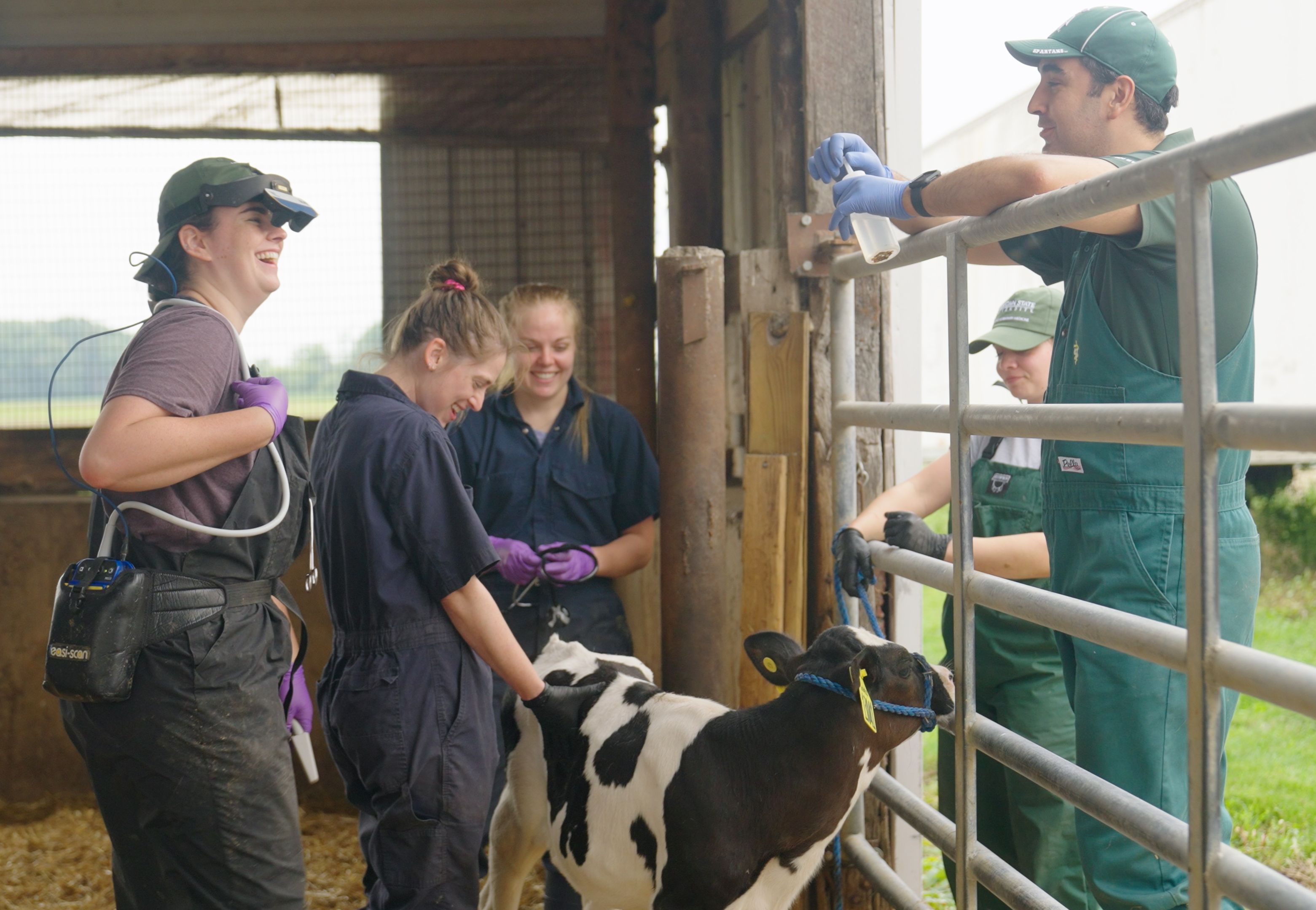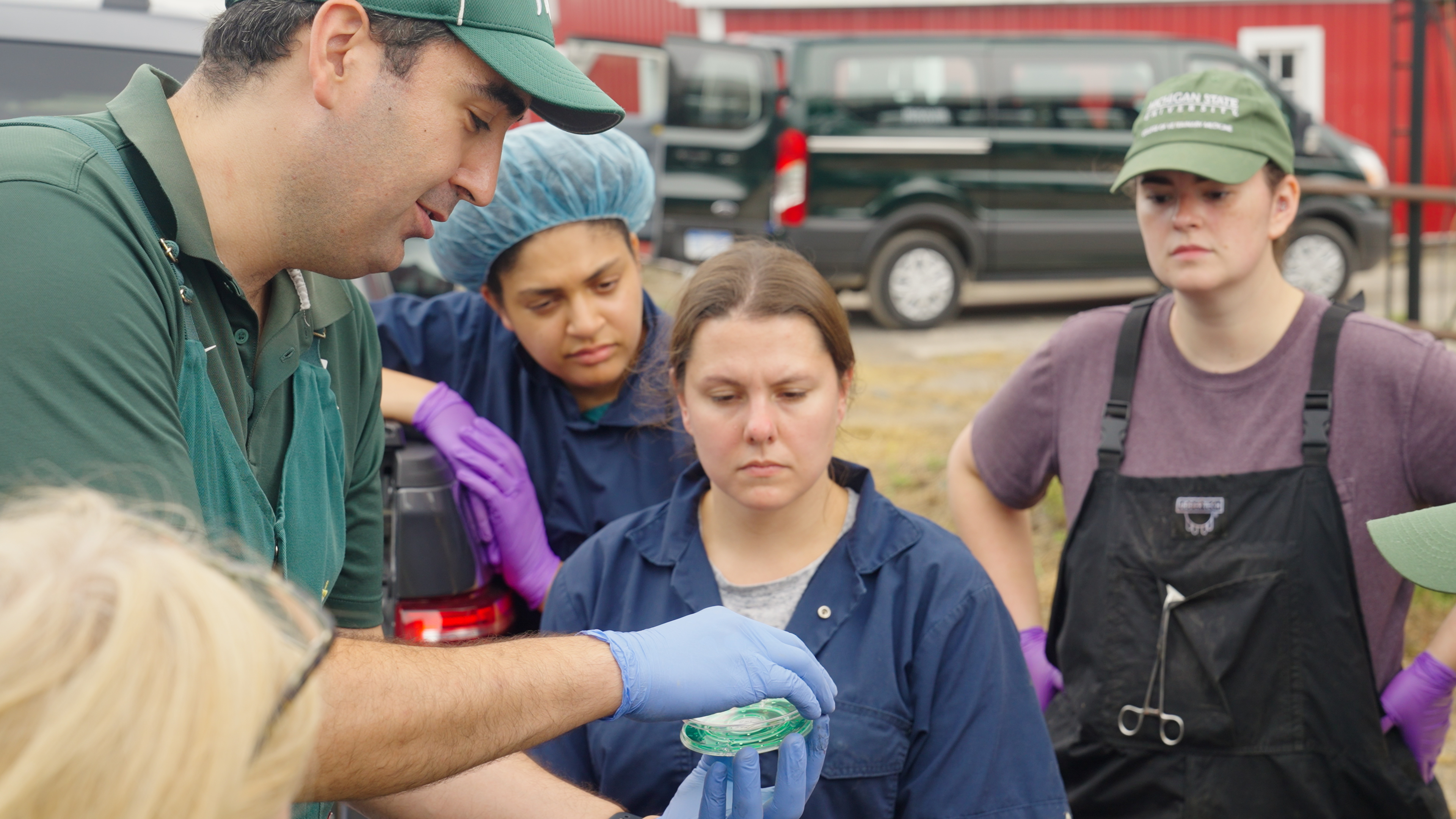Early Intervention Keeps Dairy Cows Healthy, Happy, and Productive
- Ángel Abuelo, D.V.M., Ph.D.
- Associate Professor, Department of Large Animal Clinical Sciences, College of Veterinary Medicine
- Dairy Extension Veterinarian, MSU Extension, College of Agriculture and Natural Resources
Project Overview
- The goal of the Abuelo Lab is to identify and test mechanisms that enhance immunity in calves and cows, thereby increasing their resistance to infectious diseases.
- The lab focuses on interventions such as nutritional strategies and optimization of vaccine protocols to help advance the dairy industry in Michigan, the USA, and worldwide.
Products/Outcomes
- Abuelo contributes to the clinical training of final-year veterinary students, troubleshoots problems on dairy farms, and provides continuing education to veterinarians. Abuelo has received grants to:
- develop diagnostic tools that predict major illnesses such as mastitis and metritis during the dairy cows' transition from late gestation to early lactation;
- reduce the spread of salmonella Dublin in dairy farms through evidence-based vaccination protocols; and
- strengthen dairy health through multidisciplinary doctoral training of veterinary scientists.
Partners
- Farmers representing the state's 900-plus dairy farms, 97 percent of which are family owned
- U.S. Department of Agriculture's Agriculture and Food Initiative
- Veterinarians throughout the state of Michigan
Form(s) of Engagement
- Community-Engaged Research
- Community-Engaged Teaching and Learning
When MSU veterinary medicine associate professor Ángel Abuelo and his students toured Sand Creek Dairy in Hastings, he popped into Ethan Haywood’s office. They struck up a conversation.
“That’s how we started talking about doing some research projects,” said Haywood, who runs the farm with his brother, father, and grandfather—all MSU graduates.
“We have really been trying to increase our focus on calf and young stock health,” he said. “(Ángel) was interested in coming in and trying to evaluate that further, and we were really excited.”

Ángel Abuelo works with final-year veterinary students completing an advanced dairy production medicine clinical rotation at Car-Min-Vu Farm in Webberville. The students are performing a thoracic lung ultrasound to evaluate the presence of subclinical respiratory disease in calves.
That’s just one example of the way real-world issues facing dairy farmers inform Abuelo’s research on dairy cattle health. In addition to his teaching appointment, Abuelo serves as MSU’s Extension veterinarian and runs the Abuelo Lab. For Abuelo, these roles are often intertwined, with his contact with veterinarians and farmers influencing his research and teaching and vice versa.
At the lab, Abuelo’s primary research area focuses on bolstering the immunity of dairy cattle when they are most vulnerable to disease. For calves, that period occurs at birth and during the first weeks of life. Adult dairy cows face a high risk of disease around the time of calving.
“In those two periods, the immune system of the animals is not working properly,” said Abuelo. “We are trying to see what strategies we can implement to improve their immune response and subsequently their resistance to diseases so cows don’t get sick, so they are healthier and happier and produce more milk.”
The common denominator for both cows and calves is “oxidative stress.” “Oxidative stress is damage to the cells or molecules making up cells caused by overproduction of free radicals,” said Abuelo. Animals produce free radicals naturally because of metabolic changes.
For dairy cows, producing milk after calving causes a spike in metabolic activity, which triggers the overproduction of free radicals. A similar phenomenon occurs in calves. “During the first few weeks of life, they grow really fast,” said Abuelo. Their metabolism—and production of free radicals—also goes into overdrive.
Much of Abuelo’s research, driven by his work with veterinarians and the dairy industry, focuses on nutrition. Providing micronutrients and antioxidants to cows and calves can bolster their immunity during these vulnerable periods.
Partnering with Dairy Farmers
Haywood met Abuelo at an annual calf health symposium at MSU that attracts dairy farmers and veterinarians from around the state. Calf health “is a really hot topic for us,” Haywood said. “A lot of the industry is focusing on raising less stock but doing a better job with the individuals we are raising.”
Calf health has been an interest of Abuelo’s as well. While working on his doctorate on transition cows (the period around the time of calving), he mentored a student working on a study of calves. “It opened a new area of research,” he said. “We now know the impact that a calf getting a disease early can have on future performance. Once they start producing milk, they are going to have lower production.”
Calves are at risk for diarrhea during the first three weeks of life. After that, respiratory disease can strike at four to five weeks. An estimated 33 percent of dairy calves will get sick in the first two months of life, with a national average mortality rate of 6 percent, Abuelo said.
Abuelo’s research interest in dairy calf health dovetailed with an industry-wide concern, Haywood said. “It takes us about two years to raise these animals, and another two years of production to pay off the cost of raising them. We want to set them up for success so each one can enter the herd as a healthy, productive animal.”
Nutritional Strategies
Abuelo’s research focuses on nutritional strategies to prevent disease. One intervention involves providing calves with a supplemental feeding of colostrum. At Sand Creek, newborn calves receive colostrum harvested from other animals within the first 30 minutes of life. Abuelo’s graduate students have been testing for proteins in the blood to measure the effectiveness of the program and answer the question: “Are we giving these little guys the best start we can?” Haywood said.
Additionally, Sand Creek is participating in a trial to determine whether injecting calves with minerals and vitamins at birth bolsters their immune response to vaccines. “We’re conducting the trial to see if the improvement in the immune response to the vaccine translates into fewer calves getting sick,” Abuelo said.
“We’re excited to see the data,” Haywood said. If the study shows that a particular mineral supplement provides a boost to immunity, “we’ll be making a swift switch.”
A Resource for Veterinarians
As MSU’s Extension veterinarian, Abuelo also maintains frequent contact with large-animal veterinarians, many of whom visit dairy farms weekly. So his contact with them amplifies his ability to reach out to dairy farmers and learn about the issues they face.
“The beauty of my Extension appointment is that it helps me be more present on the farms,” said Abuelo. “That contact helps me be more aware of the ongoing issues that dairy farmers and veterinarians face so that the research we do is relevant for the industry.”

Abuelo demonstrates instruments used to evaluate the transfer of passive immunity to calves, which is key to their short- and long-term health.
For example, when a salmonella infection sickened several newborn calves at a dairy farm she visits regularly, veterinarian Colleen Potter called upon Abuelo. “It’s a nasty bug we see go through some of our dairies,” said Potter, who visits several farms weekly as a large-animal veterinarian with South Kent Veterinary Hospital in Caledonia. “There are not a lot of vaccines for it. It’s a huge issue on a lot of dairy farms.”
Potter, an MSU graduate and former student of Abuelo’s, doesn’t hesitate to call him when vexing issues arise. Abuelo, meanwhile, had heard from other veterinarians and dairy farmers about the outbreak. “So I got involved with a couple of farms to help them with the outbreak investigation,” Abuelo said.
In 2021, he was awarded a two-year Michigan Alliance for Animal Agriculture (M-AAA) grant to research vaccination strategies to combat S. Dublin. A USDA grant has helped him expand on that work. The study, which is ongoing, is examining whether vaccination immediately prior to calving prevents in-utero transmission, as well as the impact of timing of vaccination for newborn calves.
Adult dairy cows are most susceptible to disease in the weeks before and immediately after giving birth. In addition to the salmonella study, Abuelo is researching nutritional strategies for preventing mastitis (a bacterial infection of the udder) and metritis (a bacterial infection of the uterus). Micronutrients can be added to their feed to strengthen their immunity before they give birth, he said.
‘Animals Were My Passion’
Whether teaching his students, doing research, or interacting with veterinarians and farmers, much of Abuelo’s work happens on dairy farms. He’s tended to cattle for as long as he can remember.
He grew up in the city of Santiago de Compostela in Spain, but his family spent every weekend and every holiday helping at one of his grandparents’ nearby dairy farms. Even when he was too small to reach them, “I would carry around a milking stool so I could ‘help’ milk the cows,” he said. As he grew older, he would help with milking, moving the cattle out to pasture, and feeding the calves.
“Animals were my passion,” Abuelo said. He decided to become a veterinarian, and he knew from the start that he wanted to specialize in dairy cattle. As a researcher, his partnership with dairy producers and veterinarians allows him to see firsthand the challenges they face and help find answers.
“It’s very fulfilling,” said Abuelo, who still relishes every opportunity to visit area dairy farms. “I went into veterinary medicine because I like cows and I wanted to care for them. It helps me to still have boots on the ground.”
- Written by Patricia Mish, University Outreach and Engagement
- Photographs courtesy of Office of Marketing and Communications at College of Veterinary Medicine, Michigan State University and Ethan Haywood